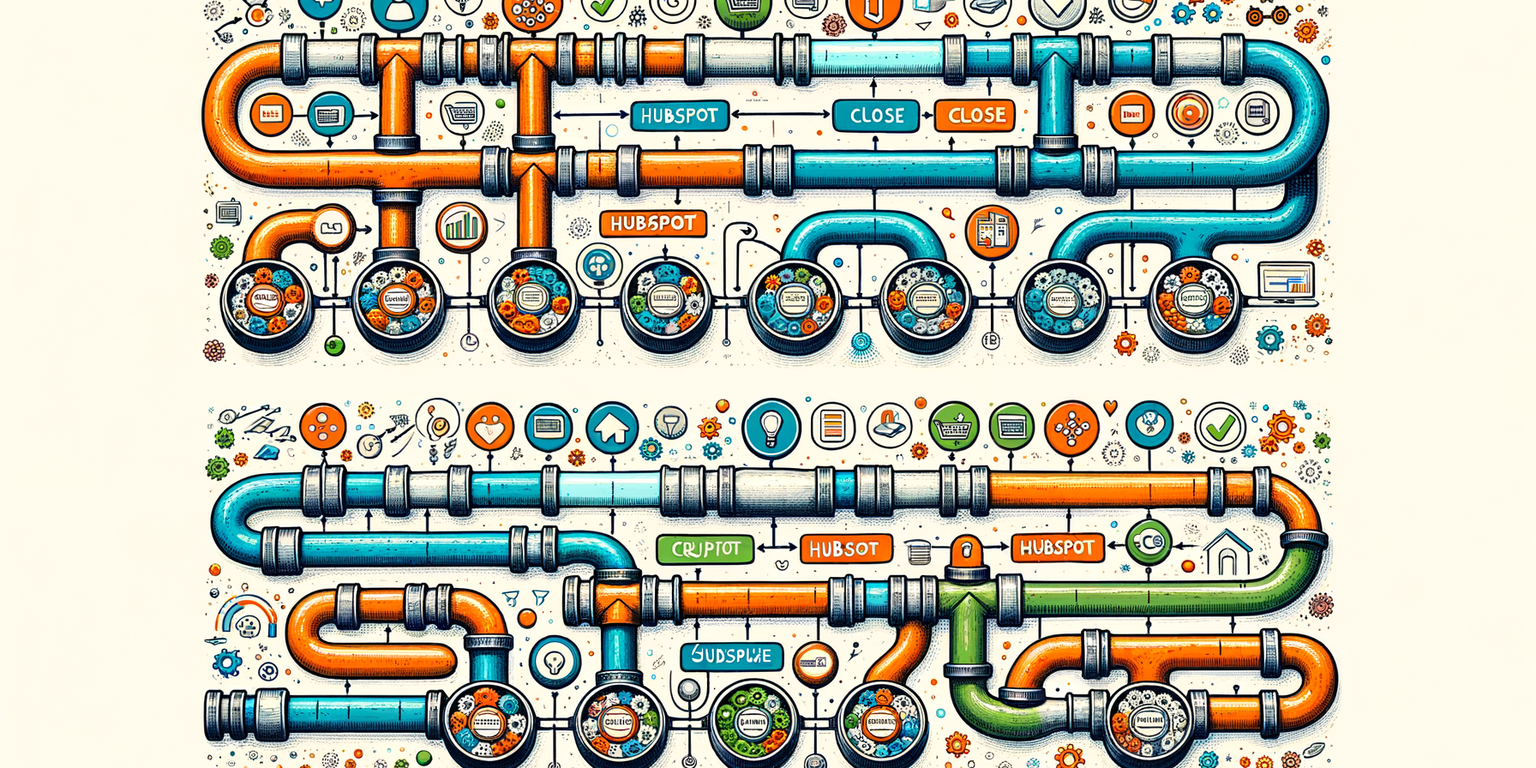Hubspot vs Close


Hubspot vs Close
In the ever-evolving landscape of Customer Relationship Management (CRM) platforms, businesses are constantly on the lookout for solutions that can streamline their operations and enhance customer interactions. Two prominent players in this field are Hubspot and Close. Both offer unique features and capabilities, catering to different business needs. This article delves into the intricacies of these two CRM platforms, comparing their strengths, weaknesses, and overall offerings to help you make an informed decision.
- Introduction
- What is Hubspot
- What is Close
- How Hubspot compares to Close
- Strengths & Weaknesses
- Conclusion
Introduction
Customer Relationship Management (CRM) systems are essential tools for businesses aiming to manage their interactions with current and potential customers. These platforms help organize, automate, and synchronize sales, marketing, customer service, and technical support. Hubspot and Close are two well-known CRM companies that have carved out their niches in this competitive market.
Hubspot is renowned for its comprehensive suite of tools that cater to marketing, sales, and customer service, making it a versatile choice for businesses of all sizes. On the other hand, Close focuses on providing a streamlined, sales-centric CRM experience, emphasizing simplicity and efficiency. While both platforms aim to enhance customer relationships, they differ significantly in their approach and offerings.
What is Hubspot
Hubspot, founded in 2006 by Brian Halligan and Dharmesh Shah, is a leading CRM platform known for its inbound marketing methodology. Headquartered in Cambridge, Massachusetts, Hubspot has grown into a global company with a vast customer base ranging from small startups to large enterprises. The platform is celebrated for its user-friendly interface and comprehensive suite of tools that integrate marketing, sales, and customer service functions.
Hubspot's CRM is particularly popular among small to medium-sized businesses due to its ease of use and affordability. The platform offers a free version of its CRM, which includes basic contact management and sales pipeline features, making it accessible to businesses with limited budgets. Hubspot's CRM also integrates seamlessly with its Marketing, Sales, and Service Hubs, providing a unified workflow for managing customer relationships.
In terms of technology, Hubspot has embraced artificial intelligence (AI) to enhance its offerings. The platform uses AI to automate routine tasks, provide insights, and personalize customer interactions. This integration of AI helps businesses save time and improve efficiency, allowing them to focus on building meaningful relationships with their customers.
What is Close
Close is a CRM platform designed with a strong focus on sales teams, aiming to simplify and streamline the sales process. Founded in 2013, Close has positioned itself as a solution for businesses that prioritize sales efficiency and effectiveness. The platform is known for its intuitive interface and robust features that cater specifically to the needs of sales professionals.
Feature Close Focus Sales-centric CRM Founded 2013 Known For Streamlined sales processes AI Integration Limited
Close is particularly appealing to small and medium-sized businesses that require a CRM focused on sales activities. The platform offers features such as built-in calling, email automation, and pipeline management, all designed to enhance sales productivity. While Close does not heavily rely on AI, its straightforward design and functionality make it a favorite among sales teams looking for a no-frills CRM solution.
How Hubspot compares to Close
When comparing Hubspot and Close, several key differences emerge. Hubspot offers a more comprehensive suite of tools that cater to various aspects of customer relationship management, including marketing, sales, and customer service. This makes it a versatile choice for businesses looking for an all-in-one solution. Hubspot's integration of AI further enhances its capabilities, providing users with valuable insights and automation features.
In contrast, Close focuses primarily on sales, offering a streamlined CRM experience tailored to the needs of sales teams. Its simplicity and ease of use make it an attractive option for businesses that prioritize sales efficiency. However, Close's limited use of AI means it may not offer the same level of automation and insights as Hubspot.
Ultimately, the choice between Hubspot and Close depends on a business's specific needs and priorities. Hubspot is ideal for companies seeking a comprehensive CRM solution with advanced features, while Close is better suited for those looking for a focused, sales-centric platform.
Strengths & Weaknesses
Understanding the strengths and weaknesses of each platform can help businesses make an informed decision when choosing a CRM solution.
Aspect Hubspot Close Strengths Comprehensive suite, AI integration, user-friendly Sales-focused, intuitive interface, efficient Weaknesses Can be complex, higher cost for advanced features Limited AI, less comprehensive
Hubspot's comprehensive suite and AI integration are significant strengths, but its complexity and cost can be drawbacks for some businesses. Close, on the other hand, excels in providing a focused, efficient sales experience but may fall short in terms of AI capabilities and overall comprehensiveness.
Conclusion
In the realm of CRM platforms, Hubspot and Close offer distinct approaches to managing customer relationships. Hubspot provides a comprehensive, AI-enhanced solution that caters to various business needs, making it a versatile choice for companies seeking an all-in-one platform. Close, with its sales-centric focus and intuitive design, appeals to businesses prioritizing sales efficiency.
Ultimately, the decision between Hubspot and Close depends on a business's specific requirements and goals. By understanding the strengths and weaknesses of each platform, businesses can choose the CRM solution that best aligns with their needs and enhances their customer relationship management efforts.
Get our newsletter
Subscribe for weekly essays on GTM, RevTech, and Clarify's latest updates.
Thanks for subscribing! We'll send only our best stuff. Your information will not be shared and you can unsubscribe at any time.